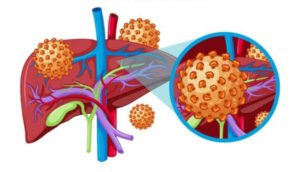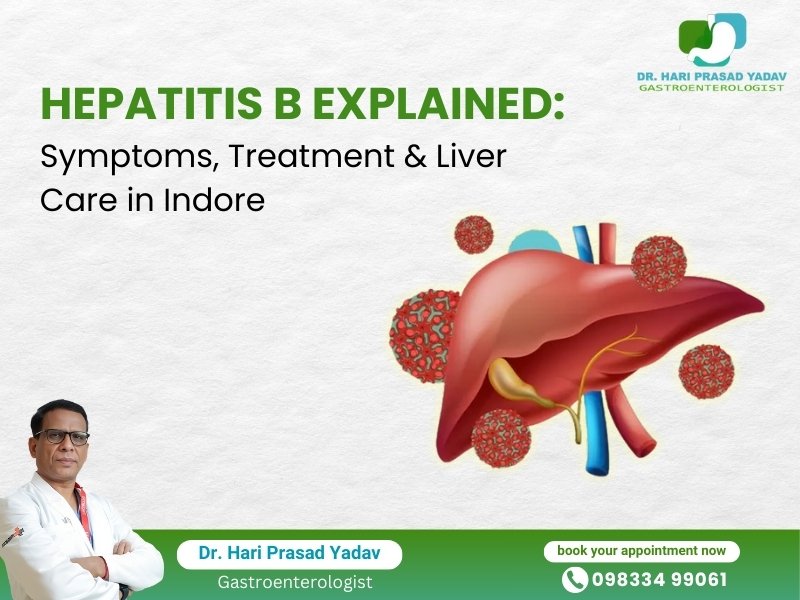Introduction
Hello, I am Dr. Hari Prasad Yadav, a specialist in stomach and liver diseases. Every week, many patients in Indore visit me with questions about Hepatitis B. Some have just learned they are infected, while others have been living with the virus for years. Hepatitis B is a virus that attacks the liver and weakens it over time. Some people clear it naturally, but others develop long-term infection. Fortunately, with proper care and timely Hepatitis B Treatment in Indore, we can control the virus and help patients stay healthy.
What is Hepatitis B?

Think of your liver as a hardworking cleaning machine in your body. It removes toxins, helps digest food, and stores energy. When the Hepatitis B virus enters the body, it attacks this cleaning machine. That’s why a Gastroenterologist in Indore checks how strong or weak the liver is and starts the right treatment plan. Moreover, early detection prevents serious complications.
How Common is Hepatitis B?
Hepatitis B is one of the most widespread liver infections worldwide. According to the World Health Organization, more than 250 million people carry this virus. In India, many people are unaware they are infected, which is why doctors recommend routine testing. By identifying the infection early, patients can start proper Hepatitis B Treatment in Indore and protect their liver health.
Symptoms You Should Not Ignore
One of the tricky parts of Hepatitis B is that it often does not show symptoms in the beginning. Many patients only discover it during a health check-up. But when symptoms do appear, they may include:
- Yellow eyes or yellow skin (jaundice)
- Dark-colored urine
- Loss of appetite
- Nausea or vomiting
- Pain in the stomach
- Extreme tiredness
- Joint pain

Sometimes these symptoms look like a common flu or stomach infection. But if they last long, a Gastroenterologist in Indore will advise blood tests to confirm whether it is Hepatitis B or not.
How Does Hepatitis B Spread?
Many patients ask, “Doctor, can I give Hepatitis B to my family by sharing food?” The answer is no. Hepatitis B spreads only through infected blood or body fluids. Common ways include:
- Sharing needles or syringes
- Unprotected sexual contact
- Transmission from mother to child during birth
- Contact with infected blood during medical procedures or injuries
Therefore, vaccination and careful hygiene are critical. A Gastroenterologist in Indore advises high-risk groups, such as healthcare workers and family members of infected patients, to take extra precautions.
Diagnosis of Hepatitis B
Since the virus hides silently, testing is the only way to confirm the infection. The main tests include:
- Blood tests: These check if the infection is acute or chronic. They also show how active the virus is.
- Ultrasound or Fibroscan: These check the stiffness of the liver and detect scarring.
- Liver biopsy: In some cases, a small piece of liver tissue is tested for detailed results.
By combining these tests, Hepatitis B Treatment in Indore can be personalized to each patient’s condition.
Treatment Options
Treatment varies depending on whether the infection is acute or chronic.
- Acute Hepatitis B: Often clears naturally within 6 months. Doctors suggest rest, fluids, and nutritious food. In severe cases, IV fluids help prevent dehydration.
- Chronic Hepatitis B: Requires long-term antiviral medicines to reduce viral activity and protect the liver. Patients usually take these medications for life.
In rare advanced cases, liver transplant may be necessary, and a skilled Gastroenterologist in Indore guides patients through every step.
Prevention is Key
Vaccination is the most effective way to prevent Hepatitis B. Moreover, it is safe, highly effective, and protects for life. Babies should receive it within 24 hours of birth, and adults who missed vaccination should complete the three-dose schedule.
Other preventive measures include:
- Avoid sharing needles, razors, or toothbrushes
- Practice safe sex
- Ensure blood used in transfusions is screened
- Wear gloves when handling blood or open wounds
Doctors providing Hepatitis B Treatment in Indore emphasize prevention because it is easier and safer than treating chronic liver damage later.
Complications if Left Untreated
If Hepatitis B is ignored, it can cause serious problems:
- Cirrhosis: Hardening of the liver due to scarring
- Liver cancer: One of the biggest risks of chronic Hepatitis B
- Liver failure: Complete loss of liver function
- Hepatitis D: A co-infection that makes the disease worse
Therefore, regular monitoring and early treatment are crucial. A Gastroenterologist in Indore can help patients prevent these complications with timely care and lifestyle guidance.
Living with Hepatitis B
Many patients feel scared when they first hear the diagnosis. But it is important to know that Hepatitis B does not mean life is over. With proper lifestyle changes and treatment, patients live full and normal lives. Some tips include:
- Avoid alcohol completely
- Eat fresh vegetables, fruits, and lean proteins
- Avoid fatty or junk food
- Exercise regularly
- Do not take medicines without doctor’s advice
- Stay connected with your doctor for regular monitoring
Patients under Hepatitis B Treatment in Indore often manage their condition well and continue with their work, studies, and family life.
Patient Success Story: Managing Hepatitis B
“Recently, a patient came to me with fatigue, yellow eyes, and stomach pain. After tests, we diagnosed Hepatitis B. I explained how the virus affects the liver and guided them through Hepatitis B Treatment in Indore. We started antiviral medicines and a healthy lifestyle plan. Within months, their symptoms improved, and blood tests showed progress. As a Gastroenterologist in Indore, I always focus on patient education and reassurance. Seeing them regain health and confidence reminded me why early detection and proper treatment make such a big difference.”
Frequently Asked Questions (FAQ)
Q1. Is Hepatitis B curable?
Dr. Yadav: Acute Hepatitis B may go away naturally. Chronic Hepatitis B cannot be cured completely but can be controlled with medicines.
Q2. How long can I spread Hepatitis B?
Dr. Yadav: You can spread it as long as the virus is active in your blood. Some people carry the virus for life.
Q3. Can Hepatitis B spread by sharing food or water?
Dr. Yadav: No, it spreads only through blood and body fluids.
Q4. Do I need to take medicine for life?
Dr. Yadav: Many patients with chronic Hepatitis B need long-term antiviral medicines.
Q5. Is vaccination safe for children?
Dr. Yadav: Yes, it is safe and highly effective. Babies should get vaccinated immediately after birth.
Q6. Can Hepatitis B cause cancer?
Dr. Yadav: Yes, chronic infection can lead to liver cancer, which is why regular monitoring is vital.
Q7. How often should I see my doctor?
Dr. Yadav: Usually every 3–6 months, depending on your condition.
Q8. Can pregnant women with Hepatitis B deliver safely?
Dr. Yadav: Yes, with proper treatment and newborn vaccination, transmission can be prevented.
Q9. Is liver transplant common in Hepatitis B?
Dr. Yadav: Only in very advanced cases when the liver fails completely.
Q10. What foods should I avoid?
Dr. Yadav: Avoid alcohol, fried, and processed foods. Eat a balanced diet with fresh, healthy ingredients.
Q11. Can children get Hepatitis B?
Dr. Yadav: Yes, unvaccinated children are at risk. That’s why vaccination at birth is so important.
Q12. Can lifestyle changes help?
Dr. Yadav: Absolutely. Healthy eating, exercise, and avoiding alcohol make a huge difference in protecting the liver.

